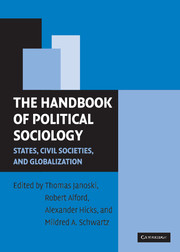Book contents
- Frontmatter
- Contents
- Preface
- Contributors
- Political Sociology in the New Millenium
- PART I THEORIES OF POLITICAL SOCIOLOGY
- 1 Rulemaking, Rulebreaking, and Power
- 2 Neopluralism and Neofunctionalism in Political Sociology
- 3 Conflict Theories in Political Sociology
- 4 Institutionalist and State-Centric Theories of Political Sociology
- 5 Culture, Knowledge, and Politics
- 6 Feminist Theorizing and Feminisms in Political Sociology
- 7 The Linguistic Turn: Foucault, Laclau, Mouffe, and Žižek
- 8 Rational-Choice Theories in Political Sociology
- 9 Theories of Race and the State
- PART II CIVIL SOCIETY: THE ROOTS AND PROCESSES OF POLITICAL ACTION
- PART III THE STATE AND ITS MANIFESTATIONS
- PART IV STATE POLICY AND INNOVATIONS
- PART V GLOBALIZATION AND POLITICAL SOCIOLOGY
- References
- Name Index
- Subject Index
9 - Theories of Race and the State
Published online by Cambridge University Press: 05 June 2012
- Frontmatter
- Contents
- Preface
- Contributors
- Political Sociology in the New Millenium
- PART I THEORIES OF POLITICAL SOCIOLOGY
- 1 Rulemaking, Rulebreaking, and Power
- 2 Neopluralism and Neofunctionalism in Political Sociology
- 3 Conflict Theories in Political Sociology
- 4 Institutionalist and State-Centric Theories of Political Sociology
- 5 Culture, Knowledge, and Politics
- 6 Feminist Theorizing and Feminisms in Political Sociology
- 7 The Linguistic Turn: Foucault, Laclau, Mouffe, and Žižek
- 8 Rational-Choice Theories in Political Sociology
- 9 Theories of Race and the State
- PART II CIVIL SOCIETY: THE ROOTS AND PROCESSES OF POLITICAL ACTION
- PART III THE STATE AND ITS MANIFESTATIONS
- PART IV STATE POLICY AND INNOVATIONS
- PART V GLOBALIZATION AND POLITICAL SOCIOLOGY
- References
- Name Index
- Subject Index
Summary
Popular notions of race have putative biological origins, but the mechanisms through which certain human characteristics come to represent categorical identities and differences have always been created by social, historical, and political processes. In the latter instance, we simply mean that racial signification is necessarily about power and, we might add, not simply the power of one group over another, but the power of any such group to collectively form a racial identity and organize in defense of it. In spite of this intimate connection between race and politics, the literature on race and the social construction of race on the one hand, and the literature on political sociology on the other, have largely developed independently and with little dialogue between them. This chapter explores the implicit and increasingly explicit connections between the two literatures with an eye to how race theory and state theory can inform one another.
First, we examine current constructivist theories of race and ethnicity, with special attention to issues concerning the political construction of race. Next, we argue that current research in the political sociology of race tends to ignore or deemphasize how states create and maintain racial identities. Race identities are typically viewed as the source of state-enforced racial policies, but are rarely seen as their effect. An examination of the social and political determinants of racial categories used by the U.S. Census provides a convenient illustration of how race identities are both causes and effects of state policies.
- Type
- Chapter
- Information
- The Handbook of Political SociologyStates, Civil Societies, and Globalization, pp. 187 - 198Publisher: Cambridge University PressPrint publication year: 2003
- 1
- Cited by

